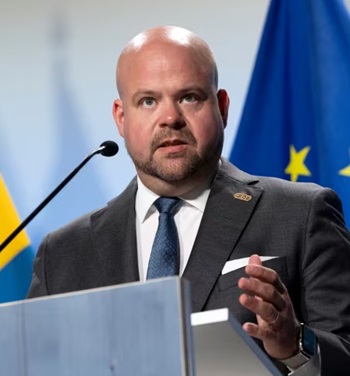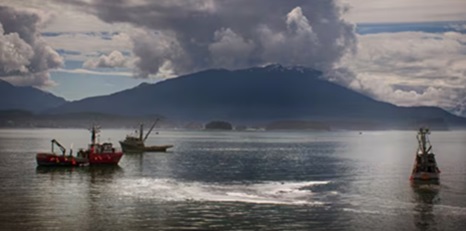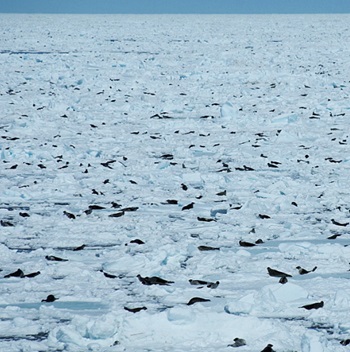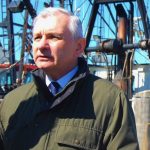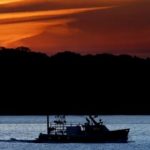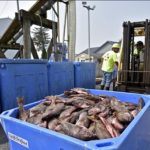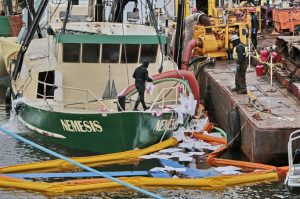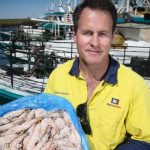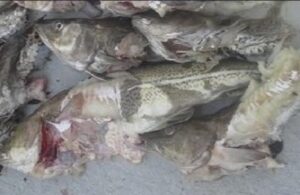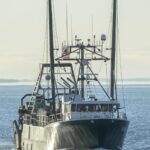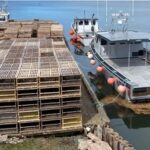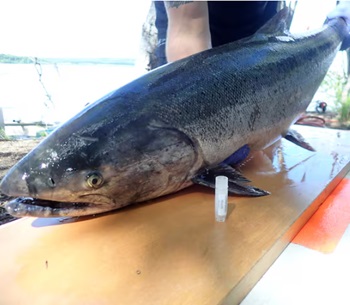 A federal appeals court on Friday reversed a judge’s decision that would have effectively shuttered an Alaska salmon fishery, a result environmentalists sought in order to protect endangered whales and threatened wild Chinook salmon populations. A three-judge panel of the San Francisco-based 9th U.S. Circuit Court of Appeals held that a judge in Seattle last year abused his discretion by vacating a key authorization issued by the U.S. National Marine Fisheries Services for the fishery’s summer and winter Chinook salmon harvests. U.S. District Judge Richard Jones at the urging of the Wild Fish Conservancy had in May 2023 vacated part of a so-called incidental take statement the fisheries service issued in 2019 that authorized the commercial Chinook salmon troll fishery in southeast Alaska. more, >>CLICK TO READ<< 10:39
A federal appeals court on Friday reversed a judge’s decision that would have effectively shuttered an Alaska salmon fishery, a result environmentalists sought in order to protect endangered whales and threatened wild Chinook salmon populations. A three-judge panel of the San Francisco-based 9th U.S. Circuit Court of Appeals held that a judge in Seattle last year abused his discretion by vacating a key authorization issued by the U.S. National Marine Fisheries Services for the fishery’s summer and winter Chinook salmon harvests. U.S. District Judge Richard Jones at the urging of the Wild Fish Conservancy had in May 2023 vacated part of a so-called incidental take statement the fisheries service issued in 2019 that authorized the commercial Chinook salmon troll fishery in southeast Alaska. more, >>CLICK TO READ<< 10:39
Tag Archives: canada
Sea lamprey control program receives OK to rehire federal workers, after initial scare
 The Great Lakes’ Sea lamprey control program has the OK to rehire three dozen federal employees it needs to combat the eel-like, invasive fish species. That’s after staffing cuts and hiring freezes from the Trump administration last month threatened the work, which the Great Lakes Fishery Commission said would have led to more than $200 million in lost fishing potential. The Great Lakes Fishery Commission is a Canadian American commission which coordinates lamprey control across the Great Lakes region. Each year, the commission contracts workers with the U.S. Fish and Wildlife Service to set traps and apply lampricide in rivers, stopping lamprey before they enter the Great Lakes. more, >>CLICK TO READ<< 10:40
The Great Lakes’ Sea lamprey control program has the OK to rehire three dozen federal employees it needs to combat the eel-like, invasive fish species. That’s after staffing cuts and hiring freezes from the Trump administration last month threatened the work, which the Great Lakes Fishery Commission said would have led to more than $200 million in lost fishing potential. The Great Lakes Fishery Commission is a Canadian American commission which coordinates lamprey control across the Great Lakes region. Each year, the commission contracts workers with the U.S. Fish and Wildlife Service to set traps and apply lampricide in rivers, stopping lamprey before they enter the Great Lakes. more, >>CLICK TO READ<< 10:40
Collapse of Germany’s offshore wind subsidies a cautionary tale for Canada
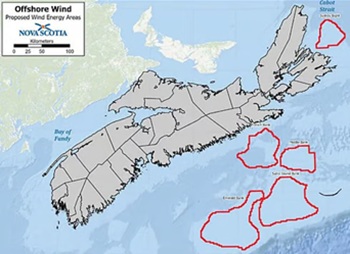 It’s an ill wind that blows nobody good. And in Germany, it might be better if the wind didn’t blow at all after the European Union member moved to start dismantling its flagship Alpha Ventus project after just 15 years. Despite its role as a pioneering wind farm, Alpha Ventus is being shut down — not because of technological failure, but because it is no longer financially viable without massive government subsidies. For Canada, which hopes to use offshore wind to support industries like green hydrogen production, the German experience raises critical questions about the long-term economics of offshore wind power. Without sustained financial support, will Canada’s ambitious offshore wind plans suffer the same fate? Germany has long been a global leader and pioneer in renewable energy. Alpha Ventus was built in 2009 as its first offshore wind farm, benefiting from generous state subsidies. more, >>CLICK TO READ<< 07:44
It’s an ill wind that blows nobody good. And in Germany, it might be better if the wind didn’t blow at all after the European Union member moved to start dismantling its flagship Alpha Ventus project after just 15 years. Despite its role as a pioneering wind farm, Alpha Ventus is being shut down — not because of technological failure, but because it is no longer financially viable without massive government subsidies. For Canada, which hopes to use offshore wind to support industries like green hydrogen production, the German experience raises critical questions about the long-term economics of offshore wind power. Without sustained financial support, will Canada’s ambitious offshore wind plans suffer the same fate? Germany has long been a global leader and pioneer in renewable energy. Alpha Ventus was built in 2009 as its first offshore wind farm, benefiting from generous state subsidies. more, >>CLICK TO READ<< 07:44
Canada commits over C$6 billion to fight impact of US tariffs, find new markets
 Canada on Friday unveiled billions of dollars in aid and other forms of support to businesses and people expected to be directly affected by U.S. tariffs. These relief measures involve over C$6.5 billion ($4.52 billion) of financial aid to help companies tap new international markets, absorb the impact of losses, access easy loans and prevent layoffs, a team of ministers said. U.S. President Donald Trump’s administration imposed 25% tariffs on most imports from Canada and Mexico earlier this week, before announcing a suspension of the charges until April 2 on goods covered by the U.S.-Mexico-Canada Agreement on trade. “We are moving ahead with these changes despite yesterday’s pause because businesses and workers need assurances right now,” Labour Minister Steven MacKinnon said at a news conference on Friday. more, >>CLICK TO READ<< 09:35
Canada on Friday unveiled billions of dollars in aid and other forms of support to businesses and people expected to be directly affected by U.S. tariffs. These relief measures involve over C$6.5 billion ($4.52 billion) of financial aid to help companies tap new international markets, absorb the impact of losses, access easy loans and prevent layoffs, a team of ministers said. U.S. President Donald Trump’s administration imposed 25% tariffs on most imports from Canada and Mexico earlier this week, before announcing a suspension of the charges until April 2 on goods covered by the U.S.-Mexico-Canada Agreement on trade. “We are moving ahead with these changes despite yesterday’s pause because businesses and workers need assurances right now,” Labour Minister Steven MacKinnon said at a news conference on Friday. more, >>CLICK TO READ<< 09:35
Canadian tariffs would ‘cripple’ Maine lobster industry, state’s top fisheries leader says
 Maine’s outgoing commissioner of marine resources is warning about the dire impacts of newly imposed tariffs on Canadian imports. Maine sends about $200 million worth of lobster each year to Canada, where it’s processed and sent back to the U.S. or to third markets. Marine Resources Commission Pat Keliher said the tariffs could trigger major cuts in what Maine lobstermen are paid for their catch that could “cripple” the state’s iconic fishery. “The only way for this to be made up on the cost perspective is at the boat price,” Keliher said Tuesday during an appearance on Maine Calling. “So I am very concerned that going into this year, that we are going to see all time low boat prices. And… with the declining volume of lobster, we will see, potentially hundreds of people going out of business because of these tariffs.” more, >>CLICK TO READ<< 07:50
Maine’s outgoing commissioner of marine resources is warning about the dire impacts of newly imposed tariffs on Canadian imports. Maine sends about $200 million worth of lobster each year to Canada, where it’s processed and sent back to the U.S. or to third markets. Marine Resources Commission Pat Keliher said the tariffs could trigger major cuts in what Maine lobstermen are paid for their catch that could “cripple” the state’s iconic fishery. “The only way for this to be made up on the cost perspective is at the boat price,” Keliher said Tuesday during an appearance on Maine Calling. “So I am very concerned that going into this year, that we are going to see all time low boat prices. And… with the declining volume of lobster, we will see, potentially hundreds of people going out of business because of these tariffs.” more, >>CLICK TO READ<< 07:50

Guest writers: Bellingham’s SE Alaska salmon fleet threatened by lawsuits, misinformation
We appreciated Ed Johnston’s opinion editorial on Feb. 19, calling for cooperation in how we manage our salmon fisheries under the Pacific Salmon Treaty. As Washingtonians and Alaskans, we know that our shared Pacific salmon fisheries must be managed in a manner that considers how interceptions of salmon bound for distant watersheds may impact ecosystems, salmon populations and communities coastwide. That is why Washington sits alongside Alaska — as well as Canada — at the negotiating table under the Pacific Salmon Treaty. In order for our salmon and people to thrive, interceptions of salmon between the two countries must be managed using sound science and a cooperative approach. Our commitment to cooperative management and working collaboratively under the Pacific Salmon Treaty is as strong as our commitment to sustainable fishing livelihoods. more, >>CLICK TO READ<< 08:24
70-year-old giant lobster ‘Mignolet’ dies before it can be repatriated to Canada
 Giant lobster ‘Mignolet’ was supposed to be the showpiece of Jo Taveirne’s brasserie in Harelbeke. Jo named the animal after Club Brugge goalkeeper Simon Mignolet. He bought the lobster through his fishmonger and had it flown over from Canada especially. ‘The intention was to put it in the homarium (i.e. the lobster aquarium) in my business,’ he told local media. But Jo was the target of considerable online abuse. Customers accused him of being an animal torturer and did not show up for reservations. So, he finally decided to send the lobster back. more, >>CLICK TO READ<< 09:12
Giant lobster ‘Mignolet’ was supposed to be the showpiece of Jo Taveirne’s brasserie in Harelbeke. Jo named the animal after Club Brugge goalkeeper Simon Mignolet. He bought the lobster through his fishmonger and had it flown over from Canada especially. ‘The intention was to put it in the homarium (i.e. the lobster aquarium) in my business,’ he told local media. But Jo was the target of considerable online abuse. Customers accused him of being an animal torturer and did not show up for reservations. So, he finally decided to send the lobster back. more, >>CLICK TO READ<< 09:12
Will the tariff tiff tear at the fabric of Canada-U.S. seafood trade?
 From snow crab and lobster to Pacific salmon, seafood is a trade driver between Canada and the United States. This cross-border commerce has mutually benefited the two nations, but rising trade tensions now threaten this critical supply chain. This month, President Donald Trump has signed executive orders imposing broad tariffs on Canada, Mexico and China, its top trading partners. With a trade war still looming, the seafood sector faces uncertainty over pricing, market access and job security. Across Canada, industry leaders are bracing for economic fallout as possible tariffs could disrupt the flow of seafood between the two nations. The seafood trade between Canada and the United States generates billions in revenue annually, benefiting both countries. Canada imported (U.S.) $3.1 billion worth of seafood in 2023 alone, with the United States supplying the largest share at $1 billion – making up 31 percent of Canada’s total seafood imports. On the flip side, the United States imported more than $3.6 billion in seafood products from Canada, making it the country’s largest supplier. more, >>CLICK TO READ<<< 10:39
From snow crab and lobster to Pacific salmon, seafood is a trade driver between Canada and the United States. This cross-border commerce has mutually benefited the two nations, but rising trade tensions now threaten this critical supply chain. This month, President Donald Trump has signed executive orders imposing broad tariffs on Canada, Mexico and China, its top trading partners. With a trade war still looming, the seafood sector faces uncertainty over pricing, market access and job security. Across Canada, industry leaders are bracing for economic fallout as possible tariffs could disrupt the flow of seafood between the two nations. The seafood trade between Canada and the United States generates billions in revenue annually, benefiting both countries. Canada imported (U.S.) $3.1 billion worth of seafood in 2023 alone, with the United States supplying the largest share at $1 billion – making up 31 percent of Canada’s total seafood imports. On the flip side, the United States imported more than $3.6 billion in seafood products from Canada, making it the country’s largest supplier. more, >>CLICK TO READ<<< 10:39
Amid ongoing trade tensions, there’s still no timeline on N.L.’s Boston trade office
 A new trade office recently announced by Newfoundland and Labrador Premier Andrew Furey to strengthen commercial relations with New England still isn’t off the ground, as a trade war looms with the United States. Furey announced in September that the provincial government would open a trade office in Boston, located inside the city’s Canadian consulate. Last week, Fisheries Minister Gerry Byrne said the Boston office will play a key role in the province’s navigation of the current economic climate. “One of the key roles of the Boston office [is to] constantly, constantly engage U.S. consumers, U.S. business groups, U.S. congressmen, [U.S.] influencers … to get them to tell the White House that Trump’s decisions are hurting Americans,” Byrne said, appearing on a segment of VOCM’s Open Line. more, >>CLICK TO READ<< 08:29
A new trade office recently announced by Newfoundland and Labrador Premier Andrew Furey to strengthen commercial relations with New England still isn’t off the ground, as a trade war looms with the United States. Furey announced in September that the provincial government would open a trade office in Boston, located inside the city’s Canadian consulate. Last week, Fisheries Minister Gerry Byrne said the Boston office will play a key role in the province’s navigation of the current economic climate. “One of the key roles of the Boston office [is to] constantly, constantly engage U.S. consumers, U.S. business groups, U.S. congressmen, [U.S.] influencers … to get them to tell the White House that Trump’s decisions are hurting Americans,” Byrne said, appearing on a segment of VOCM’s Open Line. more, >>CLICK TO READ<< 08:29
Fish harvester says possible tariffs leave N.L.’s fishery with a lot of uncertainty
 A pause in the tariff dispute with the United States is not bringing any comfort to Lee Melindy. “We’ve got to have fishing, we’ve got to have processors, and we got a company to send it into the States,” he said. “Those are all a circle. And if one of those pieces of the circle falls apart, it is detrimental on the rest of it.” Melindy is a fish harvester based in Lumsden, N.L. He’s a full-time crew member, deck boss and helps his father — the enterprise owner — in the wheelhouse. It’s been almost 30 years since he first entered the fishery, and he’s seen a lot of changes. “Over the years, I mean, we’ve had uphill battles and we’ve been good and whatnot, but when you’re looking at a possible four years, it could be very serious into the operating of an enterprise,” he said. This week, U.S. president Donald Trump said he would put a hold on his proposed 25 per cent tariffs on Canadian goods for 30 days. With that, Prime Minister Justin Trudeau paused Canada’s counter-tariffs. Video, more, >>CLICK TO READ<<07:30
A pause in the tariff dispute with the United States is not bringing any comfort to Lee Melindy. “We’ve got to have fishing, we’ve got to have processors, and we got a company to send it into the States,” he said. “Those are all a circle. And if one of those pieces of the circle falls apart, it is detrimental on the rest of it.” Melindy is a fish harvester based in Lumsden, N.L. He’s a full-time crew member, deck boss and helps his father — the enterprise owner — in the wheelhouse. It’s been almost 30 years since he first entered the fishery, and he’s seen a lot of changes. “Over the years, I mean, we’ve had uphill battles and we’ve been good and whatnot, but when you’re looking at a possible four years, it could be very serious into the operating of an enterprise,” he said. This week, U.S. president Donald Trump said he would put a hold on his proposed 25 per cent tariffs on Canadian goods for 30 days. With that, Prime Minister Justin Trudeau paused Canada’s counter-tariffs. Video, more, >>CLICK TO READ<<07:30

Trump to pause promised tariffs for 30 days after speaking with Trudeau
Prime Minister Justin Trudeau said Monday U.S. President Donald Trump will hold off on levying tariffs on Canada for at least 30 days after Canada made a series of commitments to improve security along the border. The country can let out a collective sigh of relief — at least for now. To get Trump to shelve his punishing tariffs, Trudeau told him Canada is pressing ahead with a $1.3-billion border security plan that includes reinforcing the 49th parallel with new choppers, technology and personnel and stepping up its co-ordination with American officials to crack down on Trump’s stated priorities: illegal drugs and migrants. Trudeau said, all told, there will be 10,000 front-line personnel working along the border as part of a push to make it safer. 4 Videos, links, more, >>CLICK TO READ<< 17:49
Danielle Smith: How Team Canada can overcome Trump tariffs
 Like most Canadians, I was very disappointed with U.S. President Donald Trump’s decision to place tariffs on all Canadian goods. This decision will harm both Canadian and American consumers, workers and businesses alike, and strain the historic and important friendship between our two nations. Canada has responded with counter-tariffs of our own on specific U.S. imports that Canadians can generally purchase domestically or source from non-U.S. suppliers. Although I understand the need for this proportionate response, make no mistake, a tariff war with the United States will hurt millions of Canadian families, workers and businesses. As premier of Alberta, I am calling on my fellow premiers, the prime minister and all of our national leaders to de-escalate the rhetoric as much as possible and look to diplomacy and advocacy as our primary tool to resolve this conflict. more, >>CLICK TO READ<< 09:46
Like most Canadians, I was very disappointed with U.S. President Donald Trump’s decision to place tariffs on all Canadian goods. This decision will harm both Canadian and American consumers, workers and businesses alike, and strain the historic and important friendship between our two nations. Canada has responded with counter-tariffs of our own on specific U.S. imports that Canadians can generally purchase domestically or source from non-U.S. suppliers. Although I understand the need for this proportionate response, make no mistake, a tariff war with the United States will hurt millions of Canadian families, workers and businesses. As premier of Alberta, I am calling on my fellow premiers, the prime minister and all of our national leaders to de-escalate the rhetoric as much as possible and look to diplomacy and advocacy as our primary tool to resolve this conflict. more, >>CLICK TO READ<< 09:46
Trump announces tariff talks with Canada, Mexico as global stocks slump
 US President Donald Trump said he will discuss the punishing tariffs he has levied on Canada and Mexico with both countries on Monday, as markets sank on fears over the impact on the global economy. The 25 percent duties — footed by American companies importing from Mexico and Canada — sent European and Asian stocks slumping at the open Monday. The Mexican peso and Canadian dollar also sank against the greenback, while oil jumped despite Trump placing the levy on Canada’s energy imports at 10 percent to limit a spike in fuel prices. more, >>CLICK TO READ<< 08:12
US President Donald Trump said he will discuss the punishing tariffs he has levied on Canada and Mexico with both countries on Monday, as markets sank on fears over the impact on the global economy. The 25 percent duties — footed by American companies importing from Mexico and Canada — sent European and Asian stocks slumping at the open Monday. The Mexican peso and Canadian dollar also sank against the greenback, while oil jumped despite Trump placing the levy on Canada’s energy imports at 10 percent to limit a spike in fuel prices. more, >>CLICK TO READ<< 08:12

Trudeau hits back at the U.S. with big tariffs after Trump launches a trade war
Prime Minister Justin Trudeau announced late Saturday the federal government will hit back against the U.S. after President Donald Trump launched a trade war this weekend with punitive tariffs on all Canadian goods. Trudeau said Canada won’t stand for an attack from a country that was supposed to be an ally and friend. Ottawa will immediately levy retaliatory tariffs on a whole host of American goods as payback for Trump’s attempt to wreck the Canadian economy, Trudeau said. To start, Canada will slap 25 per cent tariffs on $30 billion worth of American goods coming into Canada as of Tuesday. The tariffs will then be applied to another $125 billion worth of American imports in three weeks’ time. Trudeau said there is more non-tariff trade action coming to try to force Trump’s hand and get him to call off the hostilities. Videos. more, >>CLICK TO READ<< 07:11

U.S. tariffs on Canadian goods will come into effect Saturday, White House says
U.S. President Donald Trump on Friday offered vague details on his plans to impose tariffs on goods coming from Canada, Mexico and China, after a spokesperson said they would take effect Saturday. White House press secretary Karoline Leavitt said the president would put a 25 per cent tariff on Canada and Mexico and a 10 per cent tariff on goods from China during a briefing on Friday. Speaking to reporters in the Oval Office hours later, Trump said he expects the tariffs would include oil, gas, steel, aluminum, copper and microchips — but potentially with staggered dates and rates, depending on the product. Foreign Affairs Minister Mélanie Joly said she heard the president’s public comments but had not received any further information. more, >>CLICK TO READ<< 09:36
A rundown of Trump’s executive actions
 President Donald Trump wasted no time announcing steps to implement many of his campaign pledges, including on immigration, energy, the military and federal workforce, casting many as reversing the policies of his predecessor, Joe Biden. “We will immediately restore the integrity, competency and loyalty of America’s government,” Trump said in his inaugural address on Monday (Tuesday AEDT). “With these actions, we will begin the complete restoration of America, and the revolution of common sense.” While Trump is still signing more orders on Monday night in Washington, here’s a brief rundown of what we know so far that his administration plans to initiate, taken from his speech, public information about the orders, briefings by incoming officials and public statements. more, >>CLICK TO READ<< 06:23
President Donald Trump wasted no time announcing steps to implement many of his campaign pledges, including on immigration, energy, the military and federal workforce, casting many as reversing the policies of his predecessor, Joe Biden. “We will immediately restore the integrity, competency and loyalty of America’s government,” Trump said in his inaugural address on Monday (Tuesday AEDT). “With these actions, we will begin the complete restoration of America, and the revolution of common sense.” While Trump is still signing more orders on Monday night in Washington, here’s a brief rundown of what we know so far that his administration plans to initiate, taken from his speech, public information about the orders, briefings by incoming officials and public statements. more, >>CLICK TO READ<< 06:23
Canada’s largest fishing vessel arrives home
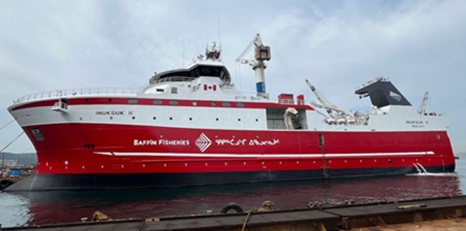 Inuksuk II didn’t get off to an easy start. Handed over to its owners at the end of September, it sailed from Yalova in Turkey in October but suffered a main engine malfunction a few days into its delivery trip. The new trawler was towed to port in Greece, before a second tow took it back to the yard in Turkey for the main engine problems to be addressed. Now it has made a belated landfall in Canada and is being prepared to start fishing operations a few months later than had originally been planned. more, >>CLICK TO READ<< 06:47
Inuksuk II didn’t get off to an easy start. Handed over to its owners at the end of September, it sailed from Yalova in Turkey in October but suffered a main engine malfunction a few days into its delivery trip. The new trawler was towed to port in Greece, before a second tow took it back to the yard in Turkey for the main engine problems to be addressed. Now it has made a belated landfall in Canada and is being prepared to start fishing operations a few months later than had originally been planned. more, >>CLICK TO READ<< 06:47
Video: Take a look inside Canada’s newest — and largest — fishing vessel – >>CLICK TO WATCH<<
Some in seafood industry see Trump as fishermen’s friend, but tariffs could make for pricier fish
 The incoming administration of President-elect Donald Trump is likely to bring big changes for one of the oldest sectors of the U.S. economy, seafood, and some in the industry believe the returning president will be more responsive to its needs. Economic analysts paint a more complicated picture, as they fear Trump’s pending trade hostilities with major trading partners Canada and China could make an already pricy kind of protein more expensive to consumers. Conservationists also fear Trump’s emphasis on government deregulation could jeopardize fish stocks that are already in peril. But many in the commercial fishing and seafood processing industries said they are excited for Trump’s second presidency. They said they expect he’ll allow fishing in protected areas as he did in his first presidency, crack down on offshore wind expansion and cut back regulations they describe as burdensome. And they expect a marked shift from the administration of President Joe Biden, who prioritized ocean conservation and championed wind power from the start. Video, more, >>CLICK TO READ<< 10:26
The incoming administration of President-elect Donald Trump is likely to bring big changes for one of the oldest sectors of the U.S. economy, seafood, and some in the industry believe the returning president will be more responsive to its needs. Economic analysts paint a more complicated picture, as they fear Trump’s pending trade hostilities with major trading partners Canada and China could make an already pricy kind of protein more expensive to consumers. Conservationists also fear Trump’s emphasis on government deregulation could jeopardize fish stocks that are already in peril. But many in the commercial fishing and seafood processing industries said they are excited for Trump’s second presidency. They said they expect he’ll allow fishing in protected areas as he did in his first presidency, crack down on offshore wind expansion and cut back regulations they describe as burdensome. And they expect a marked shift from the administration of President Joe Biden, who prioritized ocean conservation and championed wind power from the start. Video, more, >>CLICK TO READ<< 10:26
Portugal: Cod fishing near Canada reopens after 32 years
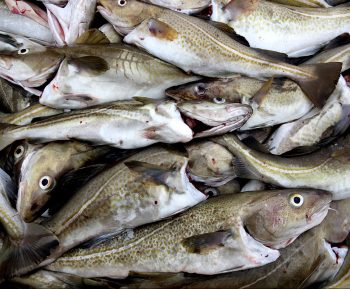 Portugal’s minister of agriculture and fisheries, José Manuel Fernandes, announced on Sunday the reopening of a cod fishing area near Canada after 32 years and said that current scientific data contradicted the proposed cut in red seabream. Speaking to Lusa, José Manuel Fernandes said that the 35% cut, to 399 tonnes, in catches of red seabream in Azorean waters, proposed on 31 October by the EU government, is based on scientific data from 2021. ‘This cut is based on scientific data from 2021 and does not reflect the recovery’ of red seabream that has been observed in the meantime, the minister emphasised, speaking to Lusa in Brussels. more, >>CLICK TO READ<< 12:11
Portugal’s minister of agriculture and fisheries, José Manuel Fernandes, announced on Sunday the reopening of a cod fishing area near Canada after 32 years and said that current scientific data contradicted the proposed cut in red seabream. Speaking to Lusa, José Manuel Fernandes said that the 35% cut, to 399 tonnes, in catches of red seabream in Azorean waters, proposed on 31 October by the EU government, is based on scientific data from 2021. ‘This cut is based on scientific data from 2021 and does not reflect the recovery’ of red seabream that has been observed in the meantime, the minister emphasised, speaking to Lusa in Brussels. more, >>CLICK TO READ<< 12:11
“THE FISH THIEF: A Great Lakes Mystery”
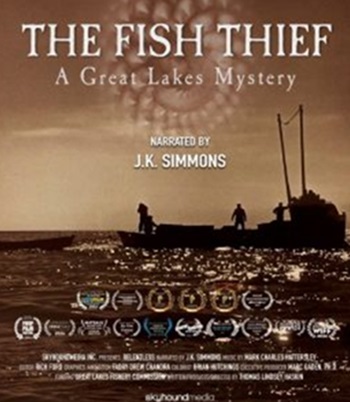 “THE FISH THIEF,” narrated by Oscar-winning actor J.K. Simmons, delves into the extraordinary effort to uncover the cause of a devastating environmental crisis. Was it overfishing, pollutants, or something else? Scientists on both sides of the border worked tirelessly to solve the mystery. In a dramatic eleventh-hour breakthrough, they discovered the true culprit: the invasive sea lamprey. This notorious predator arrived in the Great Lakes in the early twentieth century, triggering an ecological crisis and nearly wiping out populations of lake trout, whitefish, and other cornerstone species. The impact reverberated across the region, ruining local industries, damaging small town economies and indigenous communities, and destroying the livelihoods of people on both sides of the U.S. and Canadian border. A dedicated group of international scientists, policymakers, and conservationists banded together in a race against time to address this ecological invasion. more, >>CLICK TO READ<< 10:42
“THE FISH THIEF,” narrated by Oscar-winning actor J.K. Simmons, delves into the extraordinary effort to uncover the cause of a devastating environmental crisis. Was it overfishing, pollutants, or something else? Scientists on both sides of the border worked tirelessly to solve the mystery. In a dramatic eleventh-hour breakthrough, they discovered the true culprit: the invasive sea lamprey. This notorious predator arrived in the Great Lakes in the early twentieth century, triggering an ecological crisis and nearly wiping out populations of lake trout, whitefish, and other cornerstone species. The impact reverberated across the region, ruining local industries, damaging small town economies and indigenous communities, and destroying the livelihoods of people on both sides of the U.S. and Canadian border. A dedicated group of international scientists, policymakers, and conservationists banded together in a race against time to address this ecological invasion. more, >>CLICK TO READ<< 10:42
‘A lot of anxiety’: N.L. seafood industry will see big hit if Trump follows through with tariffs
 President-elect Donald Trump’s 25 per cent tariff threat is worrying people in Newfoundland and Labrador’s seafood industry. More than 60 per cent of the province’s seafood is sold in the United States. “There’s certainly a lot of anxiety right now in the seafood industry, and I’m no exception,” said Labrador Gem Seafoods’ president Danny Dumaresque in an interview with The Telegram on Wednesday, Nov. 27. Trump said in a social media post Monday night that on his first day in office, he would impose the tariffs until Canada and Mexico stop illegal border crossings and prevent drugs such as fentanyl from entering the U.S. “Both Mexico and Canada have the absolute right and power to easily solve this long simmering problem. We hereby demand that they use this power, and until such time that they do, it is time for them to pay a very big price!” Trump wrote on his social media platform Truth Social. more, >>CLICK TO READ<< 07:57
President-elect Donald Trump’s 25 per cent tariff threat is worrying people in Newfoundland and Labrador’s seafood industry. More than 60 per cent of the province’s seafood is sold in the United States. “There’s certainly a lot of anxiety right now in the seafood industry, and I’m no exception,” said Labrador Gem Seafoods’ president Danny Dumaresque in an interview with The Telegram on Wednesday, Nov. 27. Trump said in a social media post Monday night that on his first day in office, he would impose the tariffs until Canada and Mexico stop illegal border crossings and prevent drugs such as fentanyl from entering the U.S. “Both Mexico and Canada have the absolute right and power to easily solve this long simmering problem. We hereby demand that they use this power, and until such time that they do, it is time for them to pay a very big price!” Trump wrote on his social media platform Truth Social. more, >>CLICK TO READ<< 07:57
Lack of fishing prohibitions in ‘grey zone’ could pose risk for right whales, expert says
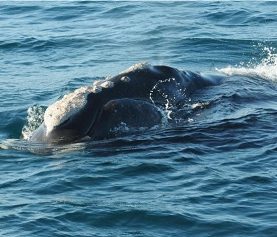 One marine conservation expert has questions about the efforts on the part of Fisheries and Oceans after North Atlantic right whales were detected in the Bay of Fundy in recent weeks, including in an area where both Canadian and American fishermen catch lobster. In October, Fisheries and Oceans announced several temporary prohibited fishing areas as the whales were detected in multiple fishing spots across the Maritimes, including in the bay. Some fishing prohibitions for parts of the Bay of Fundy started on Oct. 25 and included the fisheries for crab, herring, mackerel, groundfish, hagfish and lobster. The so-called “grey zone” is an area of disputed water near Grand Manan. Both Canada and the United States have claimed sovereignty over the area, so fishers from both countries harvest there. more, >>CLICK TO READ<< 07:57
One marine conservation expert has questions about the efforts on the part of Fisheries and Oceans after North Atlantic right whales were detected in the Bay of Fundy in recent weeks, including in an area where both Canadian and American fishermen catch lobster. In October, Fisheries and Oceans announced several temporary prohibited fishing areas as the whales were detected in multiple fishing spots across the Maritimes, including in the bay. Some fishing prohibitions for parts of the Bay of Fundy started on Oct. 25 and included the fisheries for crab, herring, mackerel, groundfish, hagfish and lobster. The so-called “grey zone” is an area of disputed water near Grand Manan. Both Canada and the United States have claimed sovereignty over the area, so fishers from both countries harvest there. more, >>CLICK TO READ<< 07:57
Opposition to seal ban grows within EU, where hunters alliance is optimistic rules will change
A group representing hunters in the Nordic countries says it’s more optimistic than ever that the European Union will lift a longtime ban on trading seal products. The regulation, implemented in 2009 after a highly successful campaign from animal rights groups, deprived Canadian sealers of their primary market. “Our hope and expectation is that the ban will be reversed, and that trade can be possible again,” said Johan Svalby, senior advisor for international affairs at the Nordic Hunters Alliance. Since beginning its review of the current regulations, thousands of individuals and organizations have participated in consultations, including the Canadian, Newfoundland and Labrador, Nunavut and Northwest Territories governments, which argued for removing the ban. more, >>CLICK TO READ<< 07:27
Baffin Fisheries’ new ship stranded in Athens after engine fails on maiden voyage
 Crew members aboard Baffin Fisheries’ Inuksuk II have spent more than 14 days docked in Athens, Greece after an engine failure stalled the fishing vessel on its first voyage. “We are very disappointed. This was entirely unexpected,” Baffin Fisheries CEO Chris Flanagan said in an interview. “We knew there would be some break-in period and glitches with a brand-new vessel. There always are and that’s expected. But we didn’t expect anything like this to happen.” more, >>CLICK TO READ<< 19:12
Crew members aboard Baffin Fisheries’ Inuksuk II have spent more than 14 days docked in Athens, Greece after an engine failure stalled the fishing vessel on its first voyage. “We are very disappointed. This was entirely unexpected,” Baffin Fisheries CEO Chris Flanagan said in an interview. “We knew there would be some break-in period and glitches with a brand-new vessel. There always are and that’s expected. But we didn’t expect anything like this to happen.” more, >>CLICK TO READ<< 19:12
NAFO Annual Meeting 2024: Key Decisions on Cod and Redfish Stocks
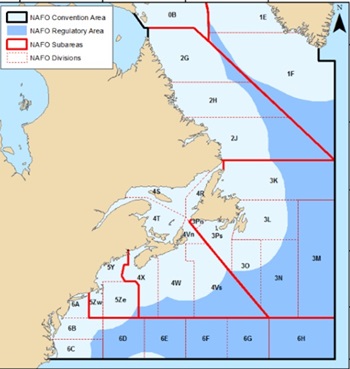 A joint proposal from the EU and Canada led to the reopening of the fishery for Northern cod in Divisions 2J, 3K, and 3L, with a revised sharing arrangement. This update was necessary, as the previous provisions had been in place since 1991. The EU’s share was increased to reflect its current composition, ensuring a fairer allocation of fishing rights. Additionally, fishing opportunities for 3M cod were increased, with existing technical measures maintained to protect the stock. NAFO’s decision rewards the fishing sector’s conservation efforts by increasing opportunities while maintaining caution to safeguard stock sustainability. A joint proposal from the EU and Canada led to the reopening of the fishery for Northern cod in Divisions 2J, 3K, and 3L, with a revised sharing arrangement. more, >>CLICK TO READ<< 08:03
A joint proposal from the EU and Canada led to the reopening of the fishery for Northern cod in Divisions 2J, 3K, and 3L, with a revised sharing arrangement. This update was necessary, as the previous provisions had been in place since 1991. The EU’s share was increased to reflect its current composition, ensuring a fairer allocation of fishing rights. Additionally, fishing opportunities for 3M cod were increased, with existing technical measures maintained to protect the stock. NAFO’s decision rewards the fishing sector’s conservation efforts by increasing opportunities while maintaining caution to safeguard stock sustainability. A joint proposal from the EU and Canada led to the reopening of the fishery for Northern cod in Divisions 2J, 3K, and 3L, with a revised sharing arrangement. more, >>CLICK TO READ<< 08:03
Fishing group, N.S. fisherman happy with Canada-France halibut deal
 Canada and France have reached a deal to try to end a long-simmering dispute over halibut fishing on Canada’s Atlantic coast. In exchange for a three per cent share of the Canadian quota, French fishing vessels will fish outside Canadian waters and agree to have their catch monitored. According to Shelburne fisherman Gary Dedrick, French fishermen have been harvesting in Canadian waters outside the designated French fishing zone surrounding St-Pierre-Miquelon, France’s eight small islands off Newfoundland’s southern coast, and not limiting their catches. “They will be allowed to fish Atlantic halibut in their own territory and also outside 200 miles, but they won’t be able to fish in Canadian waters,” said Lapointe, who is looking to federal authorities to increase monitoring and catch reporting now that there’s a formal agreement. more, >>CLICK TO READ<< 14: 19
Canada and France have reached a deal to try to end a long-simmering dispute over halibut fishing on Canada’s Atlantic coast. In exchange for a three per cent share of the Canadian quota, French fishing vessels will fish outside Canadian waters and agree to have their catch monitored. According to Shelburne fisherman Gary Dedrick, French fishermen have been harvesting in Canadian waters outside the designated French fishing zone surrounding St-Pierre-Miquelon, France’s eight small islands off Newfoundland’s southern coast, and not limiting their catches. “They will be allowed to fish Atlantic halibut in their own territory and also outside 200 miles, but they won’t be able to fish in Canadian waters,” said Lapointe, who is looking to federal authorities to increase monitoring and catch reporting now that there’s a formal agreement. more, >>CLICK TO READ<< 14: 19
Canada announces deal with France on contentious Atlantic halibut fishery
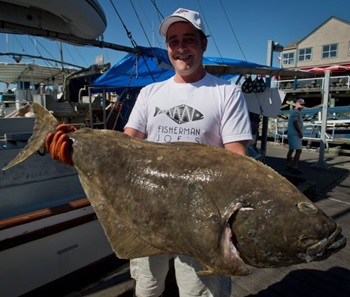 Months of negotiations have resulted in an agreement between Canada and France allowing fishers from a tiny archipelago near Newfoundland a portion of the annual Atlantic halibut catch, officials announced Monday. Fishers from the French territory of St-Pierre-Miquelon will be allowed three per cent of the total allowable catch, which is set each year by Canada, the federal Fisheries Department said in a statement. Ihe department has been working with France to reach such an agreement since 2016, the department said. “I am confident that we’ve reached an equitable agreement that will ensure the long-term health of the Atlantic halibut stock while supporting the economies and coastal communities of both Canada and France,” Fisheries Minister Diane Lebouthillie said. more, CLICK TO READ<< 15:02
Months of negotiations have resulted in an agreement between Canada and France allowing fishers from a tiny archipelago near Newfoundland a portion of the annual Atlantic halibut catch, officials announced Monday. Fishers from the French territory of St-Pierre-Miquelon will be allowed three per cent of the total allowable catch, which is set each year by Canada, the federal Fisheries Department said in a statement. Ihe department has been working with France to reach such an agreement since 2016, the department said. “I am confident that we’ve reached an equitable agreement that will ensure the long-term health of the Atlantic halibut stock while supporting the economies and coastal communities of both Canada and France,” Fisheries Minister Diane Lebouthillie said. more, CLICK TO READ<< 15:02






 There’s been lots of talk of knocking down interprovincial trade barriers to help promote the buy Canadian campaign launched in response to American tariff threats, but it’s unlikely those efforts will benefit the fishery much. Those involved in the Newfoundland and Labrador fishery have sounded the alarm, warning that the fishery would be among the province’s industries hit hardest by the 25 per cent tariffs on all Canadian exports United States President Donald Trump has promised to impose. The response of the fishing industry has been to express a need to expand its markets beyond the U.S., where much of the locally caught and processed product is sold.
There’s been lots of talk of knocking down interprovincial trade barriers to help promote the buy Canadian campaign launched in response to American tariff threats, but it’s unlikely those efforts will benefit the fishery much. Those involved in the Newfoundland and Labrador fishery have sounded the alarm, warning that the fishery would be among the province’s industries hit hardest by the 25 per cent tariffs on all Canadian exports United States President Donald Trump has promised to impose. The response of the fishing industry has been to express a need to expand its markets beyond the U.S., where much of the locally caught and processed product is sold. 